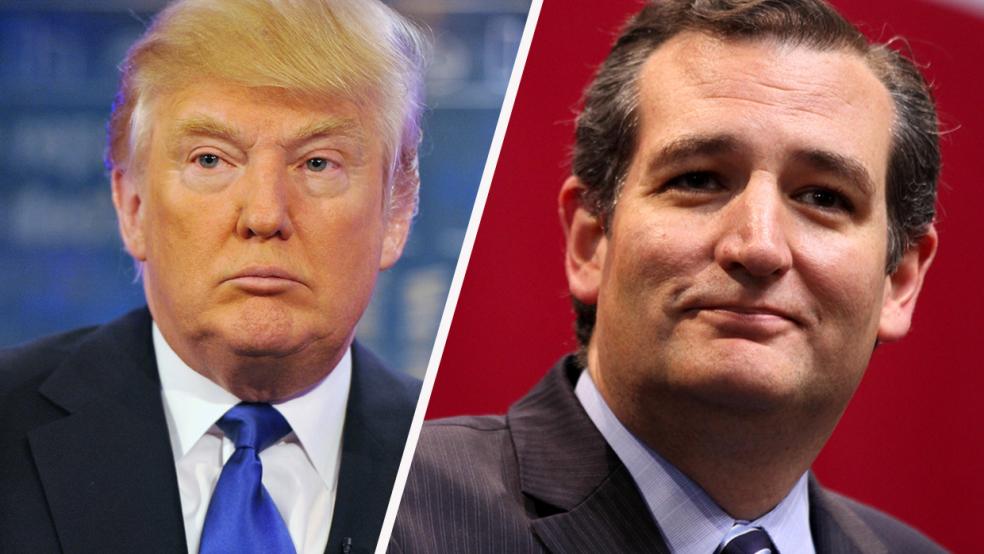Donald Trump has spent most of the past two weeks relentlessly concern-trolling his closest competitor for the Republican presidential nomination, Texas Sen. Ted Cruz, about his eligibility for the presidency. Over and over, Trump has urged Cruz, who was born in Canada to a U.S. citizen mother and a Cuban father, to go to the courts to seek a declaratory judgment finding that he does in fact meet the constitutional requirement that a president be a “natural born” citizen of the United States.
For the most part, Trump has been couching his comments about Cruz’s status in the guise of worry about a Democratic assault on the Texan’s legitimacy were he to actually be elected. In a tweet on Tuesday, for instance, Trump wrote, “Such a serious problem for Ted & the GOP. Great doubt, Dems will sue! Let's all work together to solve this problem.”
Related: David Brooks’ (Slightly) Unfair Attack on Ted Cruz
Political reporters and commentators, including this one, have dismissed Trump’s comments about Cruz’s birth in Canada as a transparent attempt to muddy the political waters – to create doubt on the part of Cruz supporters about his viability while at the same time playing to the anti-immigrant sentiments that appear to be motivating much of Trump’s political support.
Under long-established law, children born to U.S. citizens are automatically citizens themselves, regardless of where they are born. Therefore, the thinking goes, there is no question about whether or not Cruz is eligible for the presidency.
On Tuesday, though, Trump’s suggestion that Cruz has a constitutional problem received some unexpected support from a pair of law professors who, in separate op-ed pieces in The Boston Globe and The Washington Post, argued that it is far from clear that Cruz meets the “natural born citizen” requirement.
The more high-profile of the two was attorney and Harvard Law School professor Laurence Tribe, who penned an article for the Globe noting that the courts have never actually adjudicated the question of what makes someone a natural born citizen. In the article, he sides with Trump, arguing that under the definitions common when the Constitution was drafted, Cruz would not be considered natural born.
Related: Bush’s Awkward and Unfunny Ad Attacks Rubio’s Boots
“[T]he legal principles that prevailed in the 1780s and ’90s required that someone actually be born on US soil to be a ‘natural born’ citizen,” he wrote. “Even having two US parents wouldn’t suffice. And having just an American mother, as Cruz did, would have been insufficient at a time that made patrilineal descent decisive.”
The more interesting – and arguably more convincing – article though is the Post piece by Widener University Law School Professor Mary Brigid McManamon. A legal historian, McManamon lays out the common-law definition of “natural born” citizen as it would have been understood at the time the Constitution was drafted. She also points out that Congress established a process for the automatic naturalization of children born abroad to U.S. citizens.
Her point is that any person who must be naturalized – even if the naturalization occurs simultaneously with his or her birth, does not meet the definition of a natural born citizen.
She, like Tribe, makes no argument that such a requirement is just or desirable – only that a plain reading of the Constitution and the common law concepts on which it relies, requires it.
Related: Trump Plays the Birther Card on Cruz – and It’s Working
“Cruz is, of course, a U.S. citizen … Because of the senator’s parentage, he did not have to follow the lengthy naturalization process that aliens without American parents must undergo. Instead, Cruz was naturalized at birth,” she writes.
McManamon also points out that automatic naturalization has not always been part of U.S. law – meaning that the children of citizens born abroad have not always been considered citizens.
“Congress simply does not have the power to convert someone born outside the United States into a natural-born citizen,” she concludes.
Cruz pushed back on Tuesday against the arguments being made against his eligibility, but did so mainly with ad hominem attacks against those questioning his eligibility.
Related: Cruz Demands information on the Parents of Accused Terrorists
“It is more than a little strange to see Donald relying on, as authoritative, a liberal left-wing judicial activist Harvard Law professor who is a huge Hillary [Clinton] supporter. It starts to make you think gosh, why are Hillary’s strongest supporters backing Donald Trump?”
Notably, Cruz didn’t directly address the merits of the claim.





